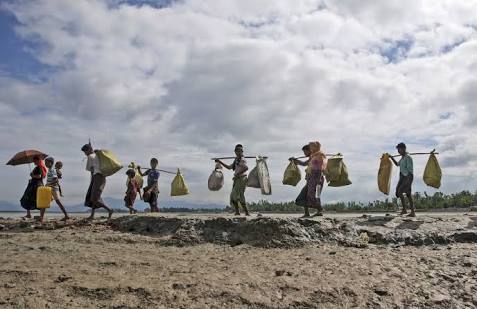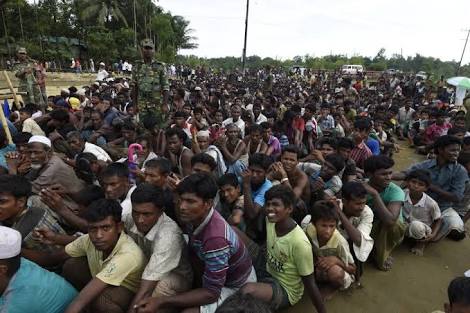A 45-year-old Rohingya man chose to escape Myanmar's Rakhine express this month when his house was set on fire. His 14-year-old girl was shot dead as he and his family kept running from their home.
.jpeg)
The man's story demonstrates that the crusade of brutality against his Muslim minority proceeds, despite the fact that an arrangement to repatriate Rohingya displaced people and Hindus from Bangladesh back to Myanmar is set to start on Tuesday. A considerable lot of the individuals who fled their homes are fearful.
"I'd preferably be executed here than be restored," the man whose house was singed told UNICEF from an outcast camp in Bangladesh, staying mysterious because of a paranoid fear of his wellbeing.
He's not the only one ― Rohingyas keep on crossing into Bangladesh by the hundreds, escaping brutality against them drove by Burma's military since the previous summer.
"They will butcher all of us," Abd-us-Salam, a Rohingya exile who is over 100 years of age and has fled three crackdowns in Myanmar, disclosed to Al Jazeera. "Kindly don't send us back as snare for the beast."
Bangladeshi and Burmese authorities arranged the repatriation bargain without the oversight of the U.N. Displaced person Agency, which normally aids such circumstances.
The assention would repatriate around 1,500 Rohingyas every week and house them in impermanent travel camps in Myanmar as their homes are modified. However with no universal checking, worldwide associations stress these defenseless individuals will be tossed appropriate over into the wretchedness they looked to escape in any case.
.jpeg)
"Most importantly displaced people need to choose themselves when they feel it's protected to backpedal, the procedure of the repatriation is sheltered and conditions on the ground influence them to feel safe," Caroline Gluck, a U.N. Evacuee Agency senior open data officer, told HuffPost.
Absolution International called the repatriation bargain "alarmingly untimely" and indicated conditions the two governments have set out in the plan. For one, Rohingyas intrigued by returning are required to give confirmation of citizenship, something the greater part don't have. Likewise, the Burmese government hasn't shown it will change its position on the Rohingya, a group it has seen with abhor for quite a long time.
A 15-year-old outcast kid who said he was shot in the arm while going into his home, and later had the appendage excised in the wilderness, revealed to UNICEF he would just return home if his rights were ensured.
"We will backpedal in the event that we get perceived as Rohingya, and our property, bovine and house back," he told the U.N. kid support association.
Another worry is that Rohingyas who have fled to Bangladesh haven't been educated about the potential repatriations, said a UNICEF media and interchanges representative.
They "completely would prefer not to backpedal," the representative said. "They're brimming with fear. On the off chance that you take a gander at past situations where Rohingya individuals have been returned, it has prompted more mistreatment."
The U.N. Evacuee Agency hasn't seen a rundown of individuals intending to return, as per Gluck. She derived that the first to leave would be Rohingya displaced people who have been stuck in Bangladesh since the 1990s. They, as well, just need to return if their rights are ensured, she said.
More than 655,000 Rohingyas have fled Myanmar since August, when the Burmese military reignited a crackdown on the religious minority after Rohingya aggressors apparently assaulted a few police posts. Rights bunches have blamed experts for rundown executions, and in addition across the board assault and torment that add up to ethnic purifying. More than 40 towns have been totally wrecked, Human Rights Watch decided.
.jpeg)
The repatriation procedure, in the event that it starts one week from now, would take an expected two years, Gluck said. The U.N. Displaced person Agency and other guide associations intend to stay in Bangladesh as long as their help is required.
"Despite everything they require administrations, they require access to wellbeing, they will require sustenance and water," Gluck said. "This is as yet a long haul operation."